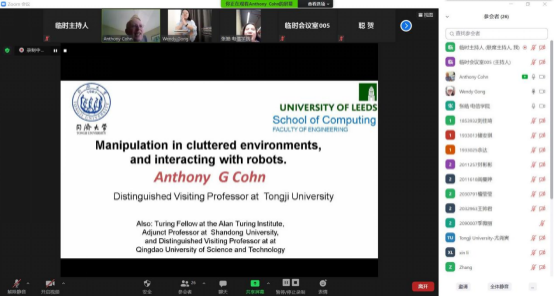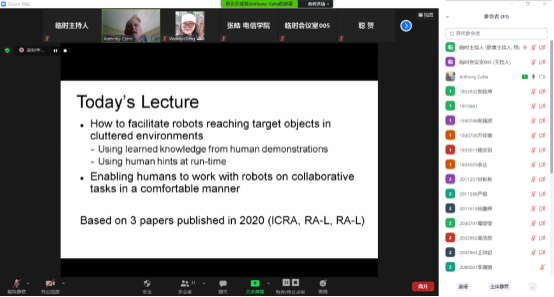On April 23, professor Anthony G Cohnfrom the University of Leeds, UK, was invited to participate in the Zhixin Lecture. Through the ZOOM online meeting, he gave an academic report about " Manipulation in cluttered environments, and interacting with robots " , and carried out academic exchanges and discussions with teachers and students.

Robot behavior trajectory planning is an important direction in the field of robotics research. It collects environmental information and uses algorithms to provide planning for the robot's actions to improve the usability of the robot. Existing trajectory planning research enables robots to replace human workers in highly repetitive scenes. However, robots are still unable to handle objects in cluttered environments with a high degree of freedom and a large number of objects, because most machine planning cannot effectively find and manipulate objects in this environment.
In the lecture, Professor Anthony G Cohn introduced part of the research results of his team in this direction: a robot trajectory planning method based on human demonstration. This method uses virtual reality technology to capture human demonstrations, and uses qualitative spatial reasoning to abstract decision-making, so that robots can learn human demonstration behaviors and make similar actions in cluttered environments. He showed the test videos and results of the method on VR data, physics simulation robots and real robots. The results show that its performance is better than the latest standard trajectory optimization algorithm, and it can generate effective rapid planning strategies without being affected by the number of obstacles in the environment.

Anthony G Cohn is a professor at the School of Computer Science at the University of Leeds in the United Kingdom and a member of the Royal Academy of Engineering. He has many honorary titles. His work in qualitative spatial reasoning has opened up new research fields and has had a significant impact in fields such as geographic information science, computer vision, natural language processing, ontology, and robotics.
Written by Gong Xiaoliang
Photographed by Gong Xiaoliang